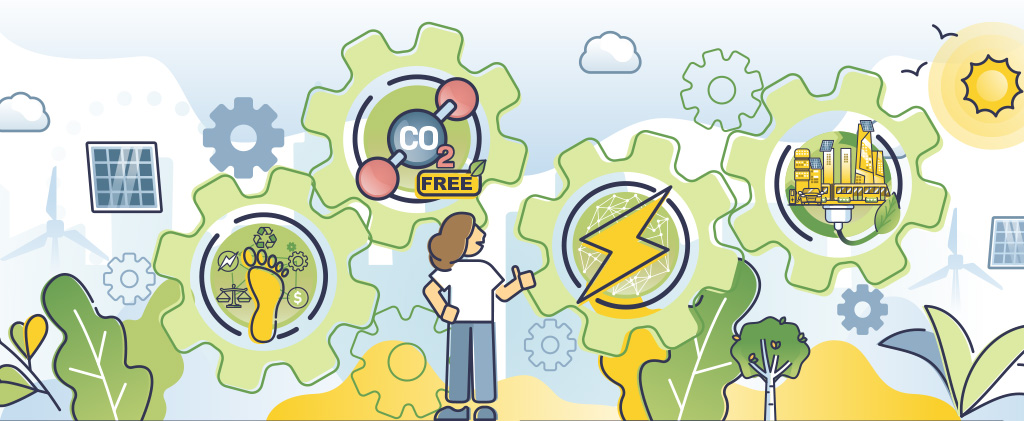

Target audience
Professionals (decision-makers, specialists, entrepreneurs, etc) working in energy transition, territorial development, environmental planning, or sustainable investing within:
- communal / cantonal / federal authorities
- environmental or engineering consultancies / associations
- companies in the energy sector or in the clean tech industry
- financial and investment institutions
- private or public organisations aiming to engage in sustainable net-zero pathways
Introduction
Understanding and addressing the complex challenges associated with transitioning to a sustainable energy future requires a holistic and systemic approach. How can we lead the energy transition while balancing economic viability, social acceptability, and environmental sustainability?
The Sustainable Energy Systems Engineering: Integrated Approach to Energy Transition programme enables participants to adopt a multidisciplinary approach, integrating the technical, economic, environmental, social, and ethical skills needed, to assess sustainability performance with a systemic perspective across the entire value chain.
Completing the CAS is a real opportunity to advance your career, as there is a significant need for professionals trained in an integrated approach who can develop robust solutions for a sustainable energy future. Multidisciplinary problem-solvers will be invaluable to identify sustainability trade-offs and support organisations navigating complex transitions.
And for those aiming to pursue advanced specialisation, the CAS is also a first step into the following two advanced programmes:
Objectives
- Understand holistically the energy system and the sustainability challenges (energy markets & economics, planetary boundaries, health and environmental impacts, circular economy, public policies & legal frameworks, renewable energy technologies, etc.)
- Analyse and model energy transition pathways through system integration and optimisation at a territorial level
- Acquire life cycle assessment (LCA) expertise to assess the environmental impacts of energy conversion, storage and distribution technologies
- Evaluate social impact and acceptance of energy projects
- Design strategies and public policies to activate a sustainable energy transition within the constraints imposed by economic, social and political factors
Cursus & Certification
The Certificate of Advanced Studies (CAS) in Sustainable Energy Systems Engineering: Integrated Approach to Energy Transition combines face-to-face and synchronous online teaching and consists of:
- Asynchronous online teaching (~80h)
- Flipped classroom instruction (~27h)
- Practical group project workshops (~60)
- Practical group project (~120h) with a group report production
- Individual oral assessment
This Certificate of Advanced Studies is one of the CASs recognised in the Master of Advanced Studies (MAS) in Sustainable Energy Systems Engineering. More information here.
Title obtained: Certificate of Advanced Studies (CAS) in Sustainable Energy Systems Engineering: Integrated Approach to Energy Transition delivered by EPFL, 10 ECTS credits. Consult the Academic Regulations
ProgramME
WELCOME DAY
October 27, 2025, Energypolis
- Teaching staff and peers introduction
- Programme and teaching approach presentation
- Online platform starter kit
——————————————–
ASYNCHRONOUS ONLINE TEACHING (to be prepared before the on-site lectures and activities)
Self-paced from October 27, 2025 to March 2026, supplemented by coaching sessions with academic advisors
- Objectives: Develop a systemic thinking approach to energy transition
- Topics: Renewables: potential & challenges / Energy systems integration & optimisation / Life Cycle Assessment (LCA) / Economics & Energy markets / Resilience in energy planning & transition / Environmental & social impact assessment / Energy & climate public policies & regulatory frameworks / Industrial ecology & Circular economy / Data gathering, analysis, interpretation & visualisation / Net-zero roadmaps (SBTi, GHG protocols, etc.)
——————————————–
ON-SITE LECTURES AND ACTIVITIES
Week 1
SUSTAINABLE ENERGY TRANSITION & INTEGRATION
Mon. November 10 to Fri. November 14, 2025, Energypolis
- Flipped class: application of online learning (discussions, case studies, hands-on exercises, etc.)
- Practical group project workshop: Net-zero path-ways / Systemic modelling tools / Integration & optimization at a territorial scale of multi-energy sources & multi-demand sectors / Swiss energy transition / Material-energy-nexus / Resilience of energy systems / Energy systems integration: levers & constraints
Week 2
LIFE CYCLE PERFORMANCE OF ENERGY TECHNOLOGIES
Mon. December 8 to Fri. December 13, 2025, Energypolis
- Flipped class: application of online learning
- Practical group project workshop: Economic development, climate impacts & resilience / Sustainability challenges of energy systems and human development / Energy efficiency & footprint of renewable, fossil & nuclear technologies / LCA / Energy services value chain: conversion, storage, distribution / Systems thinking approach
Week 3
SOCIO-ECONOMICS & REGULATORY FRAMEWORKS
Mon. January 19 to Fri. January 23, 2026, Energypolis
- Flipped class: application of online learning
- Practical group project workshop: Market dynamics / Public policy tools (feed-in tariffs, renewable auctions) / Cost-benefit analysis / Costs of decarbonisation / Social impact assessments / Social acceptance of new technologies / Stakeholder engagement methods / Regulatory frameworks / Land use planning
——————————————–
PRACTICAL GROUP PROJECT & EVALUATION
- Objectives: Collaborative work (group of 3) to gain practical experience in assessing energy technologies & systems, and designing sustainable transition pathways
- Project overview: Research & documentation / Expert opinions / On-Site investigation / Modeling and assessment / Calculation and optimisation / Solution proposal
- Evaluation: Production of a group report and individual oral assessment
Participants can submit their practical group project in any Swiss national language, subject o agreement within the collaborative group.
Organisation
- Industrial Process and Energy Systems Engineering (IPESE), School of Engineering (STI), EPFL Valais-Wallis, Switzerland
- Institute of Sustainable Energy, HES-SO Valais-Wallis, Switzerland
- Energy Center (CEN), EPFL, Switzerland
Programme Academic Directors
- Prof. François Maréchal, Head of Industrial Process and Energy Systems Engineering group, EPFL
- Prof. Manuele Margni, Institute of Sustainable Energy, HES-SO Valais-Wallis
Steering Committee
- Prof. François Maréchal, Head of Industrial Process and Energy Systems Engineering group, EPFL
- Prof. Manuele Margni, Institute of Sustainable Energy, HES-SO Valais-Wallis
- Prof. Gaëtan Cherix, Director of the School of Engineering (HEI), HES-SO Valais-Wallis
- Prof. Sophia Haussener, Head of the Laboratory of Renewable Energy Science and Engineering, EPFL
- Dr. Yasmine Calisesi, Executive Director of the EPFL Energy Center
- Rigas Hadzilacos, Deputy Executive Director of Formation Continue UNIL-EPFL
CAS Academic Leadership
- Prof. Manuele Margni, HES-SO
- Prof. Michaël Aklin, EPFL
Contact
For academic questions:
Dr. Jean-Marie Fürbringer, Programme Executive Director of MAS, DAS and CAS Sustainable Energy Systems Engineering
sustainable.energy@epfl.ch
Practical Information
Course dates
Programme spread over 5 months between October 2025 and March 2026
Course venue
- Online
- Onsite: Energypolis, Sion, Switzerland
Course fee
10’000.– Swiss francs*
* Payment in instalments possible
Enrol
Admission requirements
Master’s degree from a higher education institution (EPF, HES, University), or another degree (in a field related to the programme) deemed equivalent by the Steering Committee*
* Exceptionally, candidates who do not meet the above requirements may be considered for admission, provided they can demonstrate a sufficient level of qualification with another engineering degree in a relevant domain and at least 5 years’ professional experience in the field.
Registration
Admission on file to submit to Formation Continue UNIL-EPFL. Please join to the registration form:
- Letter of motivation
- CV
- Copies of diplomas obtained
Registration deadline
June 27, 2025
Number of participants is limited.
In the media
- Energies go Green, article (in English and French) published in the EPFL magazine “Dimension” on March 14, 2024



